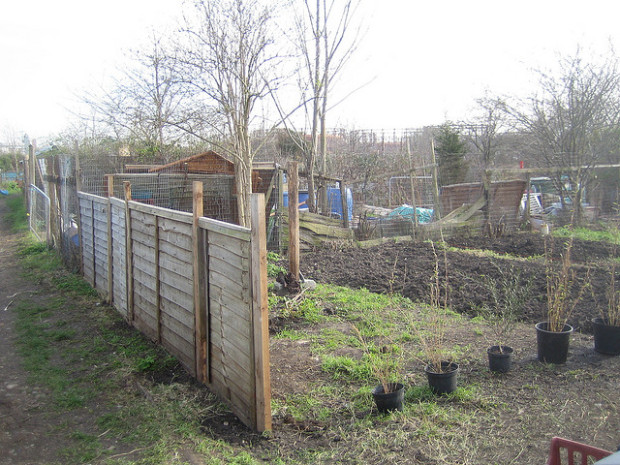You have no items in your cart. Want to get some nice things?
Go shopping
After four years of waiting, I am now number 321 in a queue of 690 waiting for an allotment in my local borough. The wait may seem long, but, as the situation currently stands – with some waiting lists extending for over a decade – it seems that I am lucky to be on a waiting list at all. Like most Londoners, I have to live with very little outside space, making the most of a single window sill and any vertical area that I have in order to produce a few small crops, interspersed with calendula and cornflowers that bring me great joy throughout the rest of the year.
Whilst there is a statutory duty for outer London boroughs to provide a “sufficient quantity”[1] of allotment plots to the people living in them, what this quantity is proportional to the number of residents in the area is unclear. And it is precisely this lack of clarity, “built up through a century of agitation”[2] in the fight for our right to allotments, that is now leading to their wanton destruction in the name of short-term profit. The law, described by Colin Ward as “both vague and voluminous” and “in urgent need of revision”, is exploited by those in power, who perceive these hard-won rights as burdensome and standing in the way of profit. If we replace the “safety first” culture of the 1960s, for that of “profit first” in the 2010s, it seems that John Betjeman put it rather succinctly: “We slice off old buildings, fell healthy trees, replace hedges with concrete posts and chain link fencing, all in the name of ‘[profit] first’, which is another phrase for ‘hurry past’.”[3]
This means that – as has been the case at Farm Terrace in Watford – a number of historically and ecologically important sites, boasting rich soils (a rare resource, particularly in London) and deep community roots (arguably equally rare), are levelled, and the living fabric of its society erased, all in the name of yet more anonymous business parks. As William Cobbett wrote, “greediness is never at a loss for excuses for the hardheartedness that is always ready to practice”[4]. Cobbett, a farmer-cum-journalist, famously championed the importance of giving people – particularly the poorest in society – access to land to cultivate their own food, quick to recognise the lesson that we have been so slow to learn, namely, that “from a very small piece of ground a large part of the food of a considerable family may be raised” and that “the very act of raising it will be the best possible foundation of education … it will teach them a great number of useful things … [and will] make them start in life with all possible advantages, and give them the best chance of leading happy lives”[5]. These lessons could not be more important at a time when deaths directly related to the consumption of ultraprocessed foods are on the increase globally, currently totalling around 18
million each year [6].
All too often our rights are relinquished or damaged in the name of a wider public interest with links to the lining of private pockets. In the postwar period, this was embodied by the destruction of rare natural habitats championed in the name of food or motorway production – now it is the destruction of our allotments in the name of the housing crisis. Often, the seizing of these common goods is done in the name of a false moral dilemma against which the protection of certain liberties seems selfish. No decent person would want to deny others food or housing, after all. However, in the case of our allotments, it is important that we recognize that the provision of space for communities to cultivate their own food and the construction of new housing stock are not mutually exclusive. Ironically, the councils that seem to be addressing these issues most pro-actively are perhaps those under the greatest pressure from issues arising from high population density and extreme poverty like Hackney and Islington, ranked among the most deprived both in London and nationally[7].
The message from Hackney’s housing assocation could not be more clearly welcoming: “If you live on an estate and you want to grow some food or even get together with some neighbours and start a community garden, Hackney Homes wants to help you.” And this is not just local political spiel. Almost every estate I have walked through seems to boast its own community orchard or adjacent community garden or allotment scheme. Of course some of these schemes could benefit from educational outreach – one community orchard I walked through recently had been denuded of fruit the year previously before the harvest had begun by over-zealous locals – but it is more than a step in the right direction. As Roger Deakin wrote when describing the hard-won smallholdings of the people of the Forest of Dean, the solution to much of our urban malaise could be found in “this smallscale people’s landscape created by a combination of hard work, mutual support, and the stubborn, often courageous assertion of the rights of the foresters and commoners to shelter and share in the land”[8].
[1] London Assembly Environment Committee,. A Lot To Lose: London’s Disappearing Allotments. London: Greater London Authority, 2006. Web. 1 June 2015.
[2] Ward, Colin. “The Hidden History Of Housing”. History & Policy. N.p., 2004. Web. 1 June 2015.
[3] Betjeman, John. First And Last Loves. Arrow Books, 1960. Print, p.12.
[4] Cobbett, William. Cottage Economy. London: W. Cobbett, 1828. Print, p.9.
[5] Ibid., p.11.
[6] Moodie, Rob et al., Profits and pandemics: prevention of harmful effects of tobacco, alcohol, and ultraprocessed food and drink industries, The Lancet , Volume 381 , Issue 9867, pp. 670 -679.
[7] Endchildpoverty.org.uk,. ‘End Child Poverty’. N.p., 2015. Web. 1 June 2015.

About Concepta Cassar
Concepta is a journalist, forager and food writer, with a particular interest in food anthropology, sustainability, and agricultural affairs. Her recipes have been featured in the Guardian, and she writes for a number of organisations, including BuzzFeed, Aftertastes, and the Soil Association. Her other great loves are literature and modern languages. Concepta speaks French and Italian, and has a working knowledge of Spanish and Russian.





We all know that privacy to work is very necessary so if you are thinking for deleting all your bing browsing history so visit this site to have useful guidelines with images.